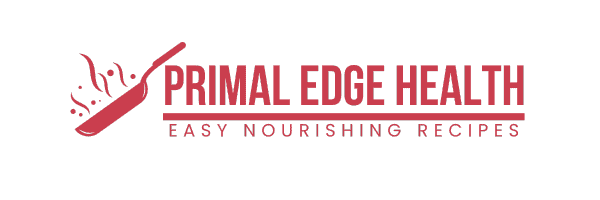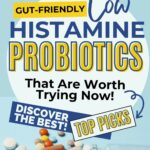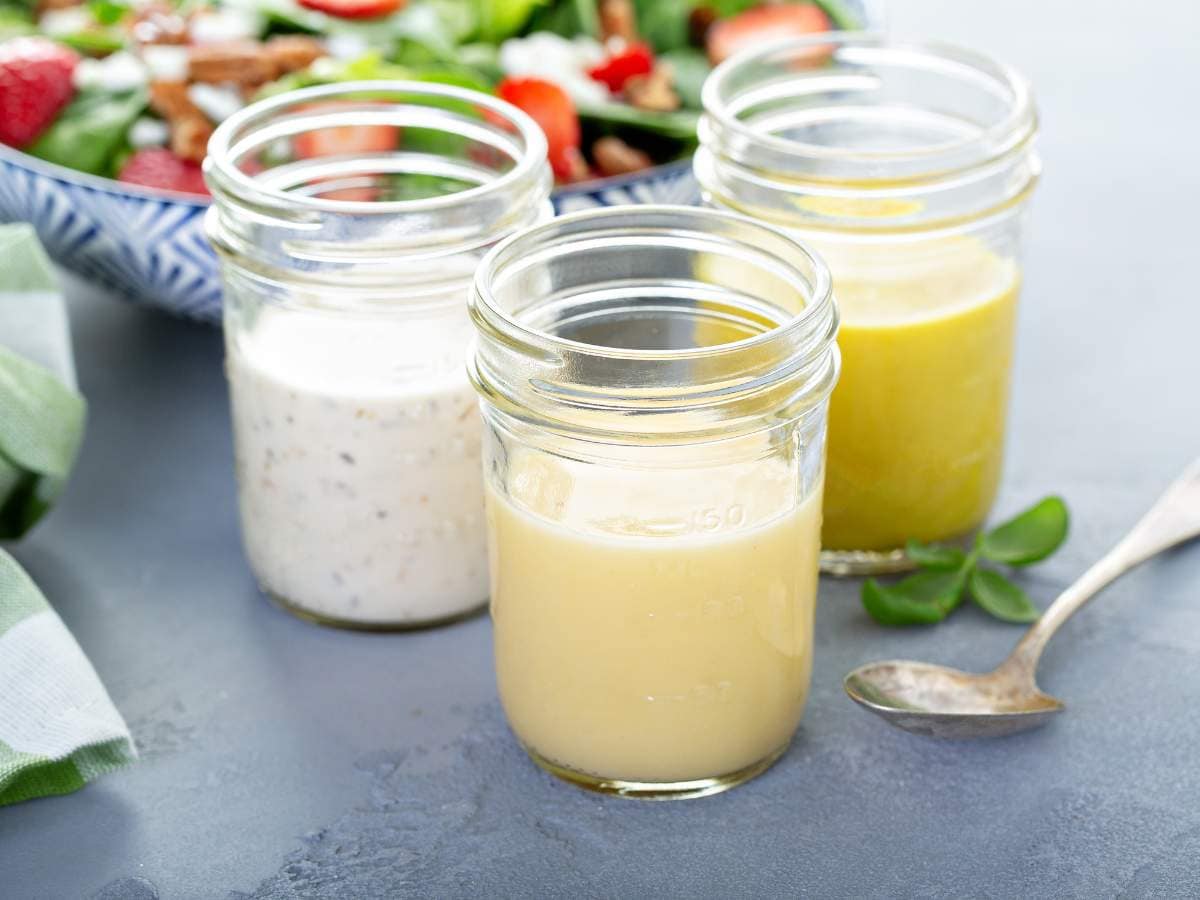Top 3 Low Histamine Probiotic Brands You Should Try
Primal Edge Health participates in the Amazon Services LLC Associates Program and other affiliate programs and therefore, may collect a share of sales or other compensation from the links on this page. This comes at no additional cost to you, and all the prices and availability are accurate at the time of publishing.
A low-histamine probiotic may be just what you need to improve your gut health while on the low-histamine diet. However, what is a low-histamine probiotic exactly? And how can you go about finding one?

When it comes to this product, we’re considering two important factors: good probiotic content and low histamine levels. It doesn’t sound easy, and trust me, it took a lot of research before I found some options that checked both boxes.
So, let’s talk about the ins and outs of low-histamine probiotics, their potential benefits, the best low-histamine probiotics, and some natural probiotic foods you can add to your low-histamine diet.
Table of Contents (click to view)
What Are Low Histamine Probiotics?
Simply put, low-histamine probiotics are specific strains of beneficial bacteria that help support gut health without producing high levels of histamine.
According to the American Academy of Allergy, Asthma & Immunology (AAAAI), histamine is a compound involved in local immune responses. It regulates physiological functions in the gut and acts as a neurotransmitter.
In some people, however, high histamine levels can trigger symptoms such as headaches, digestive issues, skin irritation, and allergic reactions. This is more commonly known as histamine intolerance.
What is Histamine Intolerance?
According to the AAAAI, histamine intolerance occurs when the body accumulates too much histamine or cannot break it down properly, leading to various symptoms. Histamine is found in certain foods and is also released by the body’s mast cells during allergic reactions.
People with histamine intolerance have a reduced ability to break down histamine due to a deficiency or impaired function of the enzymes responsible for its degradation, primarily diamine oxidase (DAO) and histamine-N-methyltransferase (HNMT). This leads to excess histamine levels, which can cause symptoms similar to allergic reactions. Common symptoms of histamine intolerance include:
- Headaches or migraines
- Digestive issues like bloating, diarrhea, and stomach cramps
- Skin problems such as hives, itching, and flushing
- Respiratory symptoms like nasal congestion, sneezing, and difficulty breathing
- Cardiovascular issues including rapid heartbeat and low blood pressure
- Menstrual irregularities and severe premenstrual syndrome (PMS)

What Probiotics are Low in Histamine?
If you have histamine intolerance, your doctor may recommend low-histamine alternatives to foods, skin products, and even supplements like probiotics. Low-histamine probiotics are carefully chosen to support your gut health without triggering those histamine-related symptoms. These may include:
- Bifidobacterium infantis: A study done by the Journal of Pharmacological Sciences indicates that Bifidobacterium infantis can help reduce inflammation and support gut health without increasing histamine levels.
- Bifidobacterium longum: The same study suggests that this strain could have a positive impact on the gut-brain axis without raising histamine.
- Lactobacillus plantarum: The Journal of Food Protection studied the effect of this bacteria on histamine and found that it could degrade histamine. Lactobacillus plantarum is known to improve gut barrier function and reduce gastrointestinal discomfort.
- Lactobacillus rhamnosus: This strain may be effective at reducing mast cell allergy-related activation, according to a study published by the World Journal of Gastroenterology. Lactobacillus rhamnosus also helps in maintaining gut health and immunity.
Can Probiotics Help With Histamine Intolerance?
Yes, probiotics can help with histamine intolerance, but it’s essential to choose the right strains. Histamine intolerance occurs when there’s an imbalance between histamine intake and the body’s ability to break it down.
On the other hand, probiotics can support gut health and improve the body’s ability to manage histamine levels, but not all probiotic strains are beneficial for those with histamine intolerance. Certain probiotic strains can help by:
Supporting Gut Health
Beneficial bacteria play a crucial role in maintaining and improving gut barrier function and overall digestive health. The gut barrier is a critical component that prevents harmful substances, such as toxins and pathogens, from entering the bloodstream.
This 2021 study published by Nutrients studies evidence that histamine intolerance originates from the gut. When this barrier is compromised, it can lead to increased intestinal permeability, commonly known as “leaky gut.” This condition can exacerbate histamine intolerance and other digestive issues.
According to the Frontiers in Microbiology, probiotics help reinforce the gut barrier in a number of ways. These include:
- Increasing Mucosal Integrity: Probiotics produce short-chain fatty acids (SCFAs) like butyrate, which nourish the cells lining the gut and improve mucosal integrity.
- Modulating Tight Junction Proteins: These proteins help seal the spaces between intestinal cells, preventing the leakage of unwanted substances. Probiotics can upregulate the expression of these proteins and maximize gut barrier function.
- Competing with Pathogens: Beneficial bacteria outcompete harmful bacteria and pathogens, reducing their ability to disrupt the gut barrier and cause inflammation.
Reducing Inflammation
Inflammation is a natural immune response, but chronic inflammation, particularly in the case of inflammatory bowel disease (IBD), can lead to various health issues. According to Dr. John Gannage, this includes histamine intolerance due to diamine oxidase (DAO) deficiency.
DAO is an enzyme responsible for breaking down histamine in the gut, and its deficiency can exacerbate histamine-related symptoms. Some probiotic strains have anti-inflammatory properties that can help calm the immune system and support DAO function, thus reducing histamine release. Probiotics help manage DAO deficiency and reduce inflammation in IBD by:
- Influencing Immune Cells: Probiotics have been shown to modulate the activity of various immune cells, leading to a more balanced immune response, according to the Journal of Clinical Gastroenterology.
- Reduction of Pro-Inflammatory Cytokines: Studies like this one published by Advances in Nutrition have demonstrated that certain probiotics can reduce the production of cytokines like TNF-alpha and IL-6, which are associated with chronic inflammation and histamine release.
Balancing the Microbiome
We need a healthy and balanced gut microbiome to regulate histamine levels and support the enzymes responsible for breaking down histamine. The gut microbiome consists of trillions of bacteria that play a crucial role in digestion, metabolism, and immune function.
In contrast, the Frontiers in Nutrition theorizes that intestinal dysbiosis may increase the risk of histamine intolerance by allowing histaminogenic bacteria to flourish. This bacteria allows histamines to accumulate at the intestinal level and may reduce the effect of bacteria that degrades histamines.
We already know that probiotics are great for gut health, but what role do they play in histamine intolerance starting at the gut level? Probiotics contribute to a balanced microbiome by:
- Increasing Beneficial Bacteria: Harvard Health states that probiotics introduce beneficial bacteria strains that can colonize the gut and promote a healthy microbiome composition.
- Reducing Pathogenic Bacteria: By outcompeting harmful bacteria, probiotics help maintain a balanced microbiome and prevent dysbiosis, a condition where harmful bacteria outnumber beneficial ones.
- Enhancing Enzyme Activity: According to the National Center for Biotechnology Information, a balanced microbiome supports the production and activity of enzymes like diamine oxidase (DAO) and histamine-N-methyltransferase (HNMT), which are responsible for breaking down histamine.
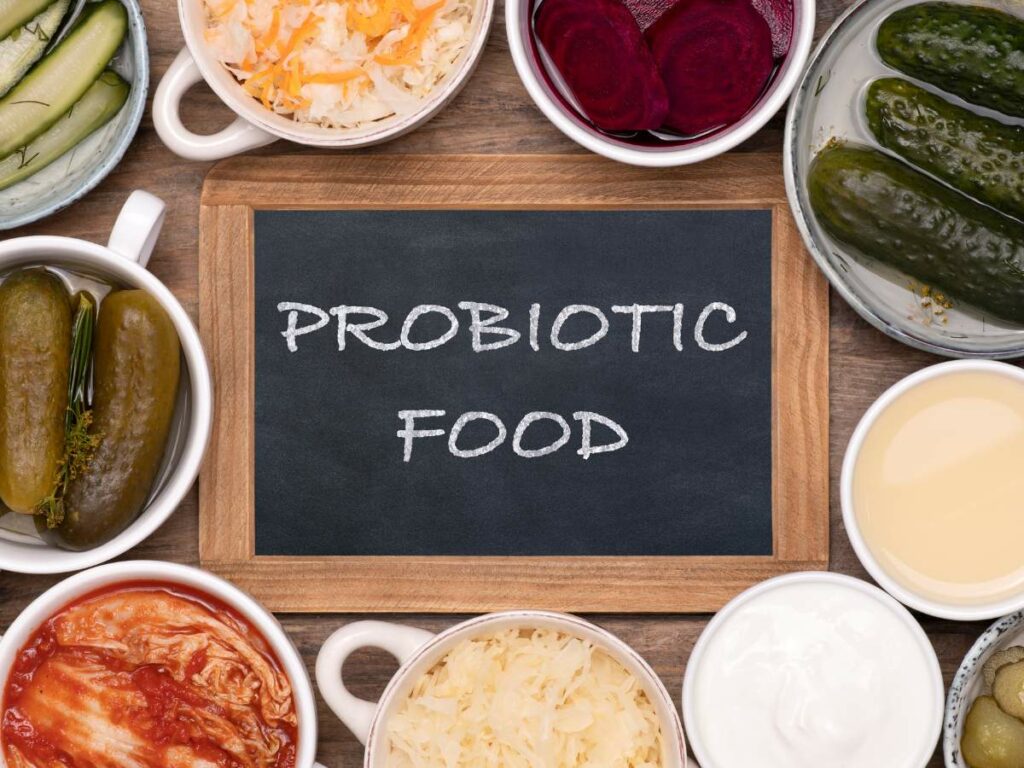
What Are The Benefits of Probiotics?
Let’s switch our focus to probiotics in general. Probiotics, often referred to as “good” or “friendly” bacteria, are live microorganisms that provide numerous health benefits when consumed in adequate amounts. So, aside from helping relieve histamine intolerance, what are the other advantages of probiotics?
Improving Digestive Health
Probiotics play a crucial role in promoting digestive health by maintaining a balanced gut microbiome. This balance is essential for optimal digestion and nutrient absorption, as well as for protecting against harmful pathogens.
One of the significant benefits of probiotics is their ability to reduce the severity and duration of various types of diarrhea, including infectious diarrhea and antibiotic-associated diarrhea. They work by restoring the natural balance of gut bacteria, which can be disrupted by infections or antibiotic use.
Additionally, certain probiotic strains, such as Bifidobacterium lactis, have been shown to regulate bowel movements and relieve constipation. According to Frontiers in Nutrition, these probiotics help increase the frequency of bowel movements and improve stool consistency, providing relief for individuals suffering from chronic constipation.
A 2022 study on the effect of probiotics on IBS reveals that probiotics can alleviate symptoms of irritable bowel syndrome (IBS), such as bloating, gas, and abdominal pain. Strains like Bifidobacterium infantis have been particularly effective in reducing IBS symptoms by modulating gut microbiota, reducing inflammation, and improving gut motility.
This 2022 study by Foods also shows that probiotics can support gut barrier function, which is important for preventing the leakage of harmful substances from the gut into the bloodstream. Through strengthening mucosal integrity and modulating tight junction proteins, probiotics help maintain a strong gut barrier. This, in turn, protects against conditions like “leaky gut” and promotes overall digestive health.
Increasing Immune Function
According to Cells, probiotics can help keep your immune system in good shape, making them essential for staying healthy and fighting off illnesses. One way they do this is by boosting the activity of immune cells like T cells and macrophages. These cells are your body’s first line of defense, hunting down and destroying harmful invaders. Probiotics can ramp up their activity, making your immune response more effective.
Besides boosting immune cells, probiotics produce antimicrobial substances that stop harmful pathogens in their tracks, according to the American Society of Microbiology. These include bacteriocins and acids that create a hostile environment for bad bacteria, which prevent them from taking over your gut.
Another important role of probiotics is in calming the immune system when it’s overreacting. An overactive immune system can lead to chronic inflammation and autoimmune diseases. As mentioned in a Nutrients journal, probiotics help balance immune responses to make sure that your body reacts appropriately to threats without going overboard.
Helping in Weight Management
Probiotics and low-histamine snacks can be a helpful addition to your weight management plan while offering several benefits that support a healthy weight. For one, a randomized controlled trial by the Journal of Human Nutrition and Dietetics shows that probiotics can influence hormones that regulate your appetite, helping to control hunger and reduce overall calorie intake.
For example, certain strains of probiotics can boost the production of hormones like GLP-1, which helps you feel full and satisfied. When they curb excessive hunger and promote feelings of fullness, probiotics can help you stick to a balanced diet without feeling deprived.
Additionally, probiotics can help reduce fat absorption from the foods you eat. Some strains, such as Lactobacillus gasseri, have been shown to block the absorption of dietary fats and increase the amount of excreted fat, as shown by this study published in the European Journal of Nutrition. This means fewer calories from fat are absorbed into your body, which can help prevent weight gain and support weight loss efforts.
According to Food Science and Human Wellness, probiotics also play a role in boosting your metabolism. They can increase the production of short-chain fatty acids (SCFAs), which are beneficial compounds that enhance your metabolic rate and help your body burn more calories.
Another way probiotics aid in weight management is by reducing inflammation. Chronic inflammation is linked to obesity and metabolic syndrome, a group of conditions that increase the risk of heart disease and diabetes. Probiotics, especially strains like Bifidobacterium lactis and Lactobacillus rhamnosus, can help lower inflammation levels in your body, which can improve insulin sensitivity and reduce the risk of obesity-related health issues.
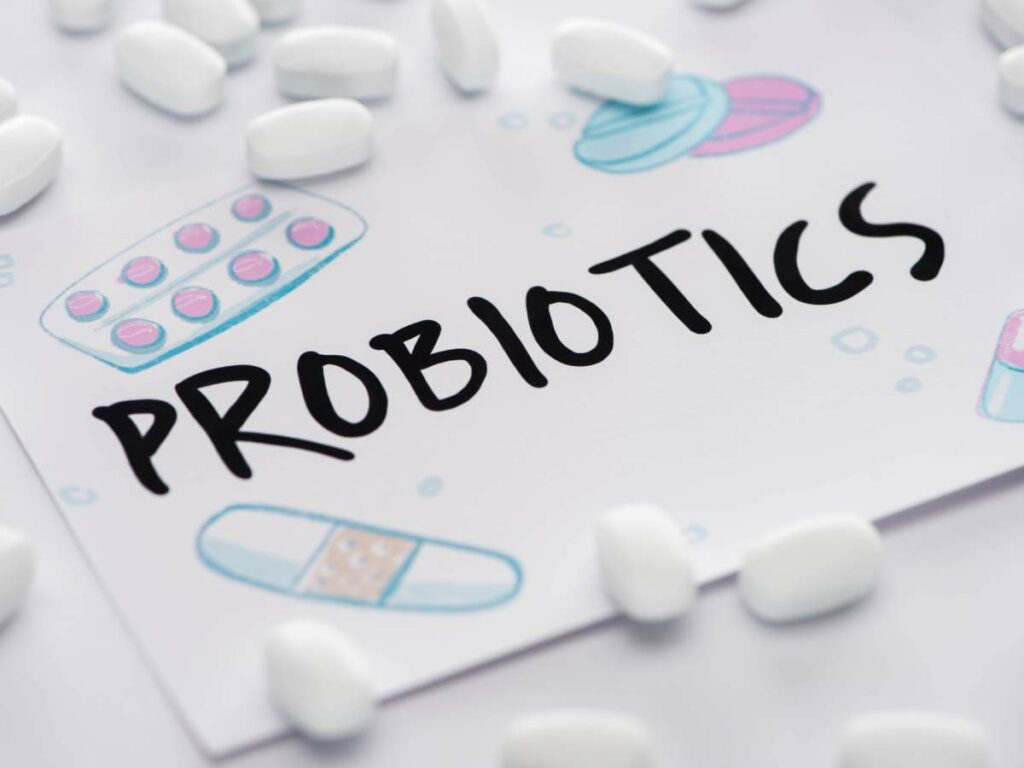
How to Choose the Right Probiotic
Choosing the right probiotic can make a big difference in your health if you’re dealing with specific issues like histamine intolerance. Here are some tips I recommend to help you pick the best probiotic for your needs:
Pick the Right Form
When it comes to probiotics, you can choose between capsules and powders. Both forms have their benefits, so it depends on your preference and lifestyle.
- Capsules: These are convenient and easy to take, especially when you’re on the go. Capsules also protect the probiotics from stomach acid, which makes sure that more of the beneficial bacteria reach your gut.
- Powders: Probiotic powders can be mixed into water, smoothies, or other beverages like my favorite green smoothie, making them a good option if you prefer not to swallow pills. They often come in higher doses and can be easier to adjust the amount you take.
Choose a Probiotic That Lowers Histamine Levels
If you have histamine intolerance, your doctor may recommend choosing probiotic strains that don’t produce histamine and can even help lower histamine levels. As we’ve mentioned before, here are some strains known for their low histamine production:
- Bifidobacterium infantis
- Bifidobacterium longum
- Lactobacillus plantarum
- Lactobacillus rhamnosus
- Lactobacillus gasseri
Avoid Ingredients That Can Trigger Mast Cells
According to AAAAI, mast cells are immune cells that release histamine and other chemicals during allergic reactions. To avoid triggering these cells, look for probiotics that don’t contain common allergens or additives. Here’s what to watch out for:
- Additives and Fillers: Some probiotics contain additives, fillers, or artificial colors that can trigger mast cells. Always check the ingredient list and choose products with minimal and natural ingredients.
- Common Allergens: Avoid probiotics that contain allergens like dairy, soy, gluten, or corn if you’re sensitive to these ingredients. According to the Yale Journal of Biology and Medicine, they can trigger mast cell activation and histamine release.
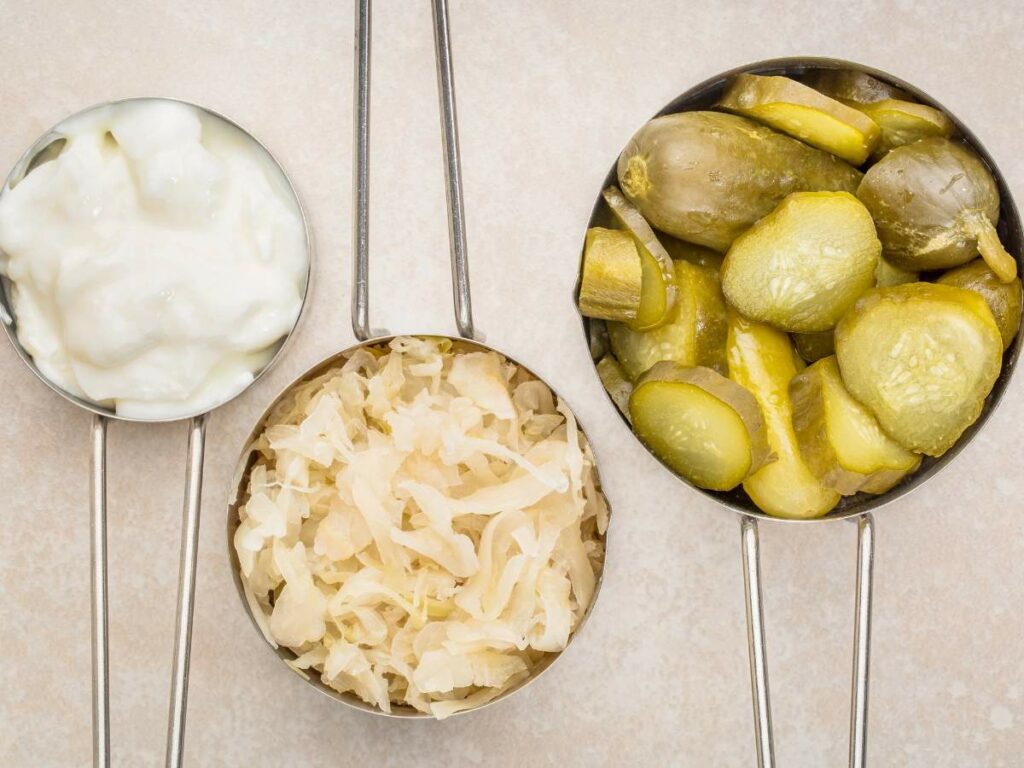
Best Low Histamine Probiotics
Now that you know the potential benefits of low-histamine probiotics—both in general and for someone with histamine intolerance—let’s answer the next question: where can you find the best low-histamine probiotics?
There are only a few probiotic products that are specifically low-histamine, but I’ve found a few worth trying. Here are some of my favorites:
VitaMonk Low Histamine Probiotics
As someone with histamine intolerance, finding a probiotic that doesn’t trigger my symptoms has been a game-changer. The strains included in Vitamonk’s Low Histamine Probiotic, like Bifidobacterium infantis and Lactobacillus rhamnosus, are specifically chosen for their low histamine production, which is perfect for my needs.
Over time, I noticed a significant improvement in my digestion and overall gut health. The capsules are easy to take, and I appreciate that they don’t contain any common allergens or unnecessary fillers, which can trigger mast cell reactions.
Overall, I’m thrilled with how these probiotics have helped me manage my histamine intolerance and improve my digestive health. If you have similar issues, give these 100% natural capsules a try.
Seeking Health ProBiota HistaminX
I also tried the Probiota HistaminX from Seeking Health, and I have nothing but good things to say. The blend of ingredients like quercetin, bromelain, and stinging nettle works synergistically to reduce my histamine symptoms significantly.
Moreover, the vegetarian capsules are easy to swallow and fit well with my dietary preferences. When I tried incorporating HistaminX into my routine, I experienced fewer allergic reactions, less nasal congestion, and an overall improvement in my daily comfort and well-being.
I highly recommend it to anyone struggling with histamine-related issues and want to reap the full benefits of probiotics without symptoms. It’s also a perfect fit for vegetarians and anyone gluten-free.
Mood Super Strains Probiotic
Lastly, we have a product that focuses on the mental health benefits of probiotics. The featured targeted strains like Bifidobacterium rhamnosus GG are known for their low histamine production and psychobiotic benefits.
During the time I took these capsules, I noticed a marked reduction in histamine-related symptoms such as headaches and digestive issues. Additionally, I felt more balanced and less anxious, thanks to the probiotic’s positive impact on the gut-brain axis.
The capsules were easy to take, free from common allergens, and seamlessly fit into my daily routine. So, I recommend Mood Super Strains Probiotic for anyone looking to manage histamine intolerance and improve their mental health.
What About Natural Low-Histamine Probiotics?
What if you don’t want to take daily supplements? Don’t worry, there are plenty of natural foods that are both rich in probiotics and not so high in histamines.
It’s best to speak to your doctor about these foods and be aware of your personal tolerance. Different brands and homemade recipes can vary in their histamine levels. In general, these are great probiotic foods, you’ll need to apply them as they best fit to your specific situation.
Fresh Yogurt
Homemade or freshly made yogurt is a fantastic source of probiotics like Lactobacillus strains and is also a great low-histamine breakfast. Unlike store-bought versions, which might contain added ingredients that can increase histamine levels, homemade yogurt makes sure you control the fermentation process, keeping it fresh and low in histamine.
If you want to try making your own yogurt, here’s a recipe for homemade yogurt from raw milk. However, I only recommend trying this out if you’re comfortable working with raw milk. Otherwise, use pasteurized milk.
Kefir
Kefir, a fermented milk drink, is an excellent source of probiotics and can be made at home using low-histamine starter cultures. This allows for better control over the fermentation process and the ingredients used, ensuring a product that is beneficial for those with histamine intolerance.
Consuming kefir soon after brewing helps minimize histamine buildup, making it a safe and effective option for boosting gut health. It’s packed with beneficial bacteria and yeast, contributing to a healthy gut microbiome. It contains strains such as Lactobacillus kefiri and Bifidobacterium species.
Kombucha
Kombucha is a fermented tea that can be a refreshing and beneficial low-histamine probiotic drink when made correctly. This effervescent beverage is created by fermenting sweetened tea with a symbiotic culture of bacteria and yeast (SCOBY).
The fermentation process produces beneficial probiotics, organic acids, and antioxidants, which contribute to its health benefits like its ability to improve digestion, boost the immune system, and detoxify the body. Want to make kombucha at home? Try this Kombucha Starter Kit.
Kimchi
Kimchi is one of my favorite superfoods because of its taste and probiotic benefits. When made with low-histamine ingredients and consumed fresh, it provides beneficial bacteria without the high histamine content found in more aged or overly fermented varieties.
Plus, kimchi is rich in vitamins, minerals, and probiotics that support digestive health, enhance immune function, and reduce inflammation. I find it hard to make authentic-tasting kimchi at home, but there are plenty of options available at the grocery store. If you can’t find it at a regular supermarket, try your local Asian store.
Miso
Lastly, we have miso, a fermented soybean paste that can be a gentle and effective probiotic source. It’s the star of one of my favorite recipes: my keto miso soup.
I recommend using white miso over other varieties. Unlike other types of miso, white miso is fermented for a shorter period, which results in a milder flavor and lower histamine levels.

How to Incorporate More Probiotics in Your Diet
Of course, the easiest way to increase your probiotic intake is to add probiotic supplements to your daily routine. However, I suggest eating more probiotic-rich foods as well.
If you don’t want to eat plain yogurt, kimchi, or sauerkraut by themselves, you can incorporate them into several low histamine recipes or use them as sides. Here are some tasty suggestions:
- Korean ground beef with kimchi
- Cauliflower rice and salmon sushi with miso soup
- Curry cabbage pancakes with yogurt sauce
- Low-carb cereal with fresh yogurt
- Beef and broccoli with kimchi
- Low-histamine yogurt salad dressing
These are just a few recipes you can add to your low-histamine meal plan. For a more satisfying dining experience, you can also pair these meals with low-histamine alcohol or low-histamine wine!
Start Adding Probiotics to Your Diet Today
Probiotics are an underrated yet essential part of any diet, especially if you’re dealing with gut issues like IBS, chronic diarrhea, and constipation. But since some probiotic strains contain histamine or trigger histamine release, they aren’t appropriate for someone with histamine intolerance or MCAS.
Luckily, there are other bacterial strains that don’t trigger histamine-related symptoms and can even lower histamine levels in the body. Since we’ve already talked about them in detail, you now know what kind of probiotic supplements to incorporate into your daily routine.
Alternatively, you can get your probiotics from natural foods like yogurt and kefir. However, keep in mind that some of these foods have moderate levels of histamine due to the fermentation process, so make sure to eat a controlled amount (or limit the fermentation if you’re making them at home).
Want more tips, recipes, and product recommendations for the low-histamine diet? Explore more of Primal Edge Health today!
